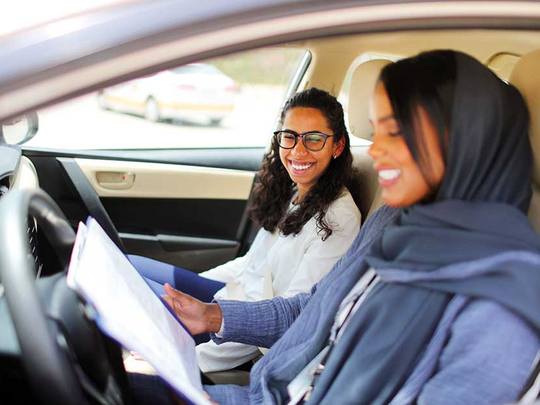
Jeddah: Today when Saudi women will be allowed to drive for the first time, Amira Abdul Kader will be sitting at the wheel, the one in control, giving a ride to her mother beside her.
“Sitting behind the wheel (means) that you are the one controlling the trip,” said the architect, dressed in a black veil, who has just finished learning to drive.
“I would like to control every single detail of my trip. I will be the one to decide when to go, what to do, and when I will come back.”
Abdul Kader is one of about 200 women at the state oil firm Aramco taking advantage of a company offer to teach female employees and their families at its driving academy in Dhahran to support the social revolution sweeping the kingdom.
“We need the car to do our daily activities. We are working, we are mothers, we have a lot of social networking, we need to go out - so we need transport,” she said. “It will change my life.”
Women make up about five percent of Aramco’s 66,000 staff, meaning that 3,000 more could eventually enroll in the driving school.
Last September, King Salman decreed an end to the world’s only ban on women drivers, maintained for decades by Saudi Arabia’s deeply conservative establishment.
But it is his son, 32-year-old Crown Prince Mohammad Bin Salman, who is the face of the wider social revolution.
Many young Saudis and expatriates alike are elated about the changes which empower women and youth.
For Abdul Kader, June 24 will be the day to celebrate that change, and there is only one person she wants to share it with.
“On June 24, I would like to go to my mother’s house and take her for a ride. This is my first plan actually, and I would like really to enjoy it with my mother. Just me and my mother, without anyone else.”
“The revolution is happening right before my eyes. No longer will I be held back due to petty convenience issues.”
She remembers being late for an important meeting she was hosting due to problems with the Careem app.
“The drivers kept canceling on me and I was late. In order to avoid such professional embarrassments in the future I always make sure to leave an hour and a half earlier if I have an important meeting,” she tells Gulf News.
Seif, who lived in Saudi Arabia since she was a toddler, never got the opportunity to learn how to drive, but she is planning on getting her driver’s license in Lebanon this summer and converting it to a Saudi one once she returns.
She would have gotten it done in Saudi Arabia, but she didn’t want to bother her father to chaperone her to all her driving appointments.
The process of converting foreign licences into Saudi ones has been described as organised and simple from the women who have already done this.
Seif says she is also happy that she will be saving a lot of money.
She typically spends up to 60 Saudi riyals a day commuting to work using Careem.
“This is a lot for a fresh graduate and it really took a toll on my pocket,” she says.
“There is going to be freedom of movement now and I can be my own boss,” she says, adding that she always hated to be a burden on her father.
While many Saudi nationals and a few well-to-do foreigners hire fulltime drivers, most expatriates resort to cab services like Careem, Uber and Easy Taxi.
A hefty amount of money and time is involved in order to commute.
Zaib Shahzad, a Pakistani-Canadian freelance photographer, who has lived in Saudi Arabia since the age of 7, says she plans to ease into driving very slowly.
Although she is an experienced driver in Canada, where she often visits, her parents worry that she will have trouble communicating to get help if her car breaks down on the road.
She says she will start out slow, taking short drives to pick up groceries for her mother.
“I want to wait and observe what happens before I fully hit the road,” she tells Gulf News.
However, she remains upbeat about the driving ban lift.
“I never thought I would see this materialise in my lifetime. It is quite exciting,” she said.
-Hina is a freelance journalist based in Jeddah
-With inputs from Reuters












